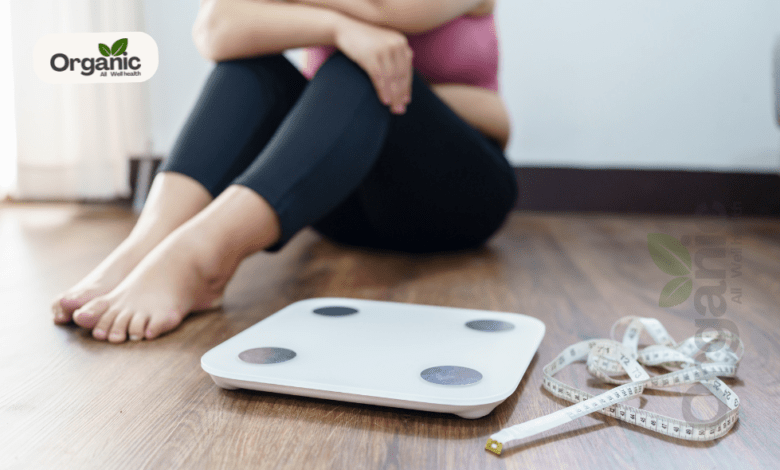Caring for Yourself Through Depression and Weight Gain:- A Complete Guide by allwellhealthorganic

Caring for Yourself Through Depression and Weight Gain is a journey that many people face, often quietly and without support. Depression can deeply affect not just our mood, but also our eating patterns, energy levels, sleep, and overall health. One of the most common and often misunderstood effects of depression is weight gain. In this detailed guide prepared by the allwellhealthorganic team, we’ll explore why this happens and share practical, compassionate strategies to care for yourself during these challenging times.
Understanding the Link Between Depression and Weight Gain
Caring for Yourself Through Depression and Weight Gain starts with understanding that weight changes are not a sign of weakness or failure. They are a natural response to the physical, emotional, and hormonal shifts that occur during depression. Many individuals notice that as their mental health declines, their weight begins to increase — this can be due to emotional eating, low energy, medication side effects, and disrupted routines.
Why Depression Can Lead to Weight Gain
Let’s explore some of the key reasons why depression and weight gain are often connected:
1. Emotional Eating as a Coping Mechanism
When people feel overwhelmed by sadness, anxiety, or hopelessness, food can offer temporary comfort. Foods high in sugar, salt, or fat may trigger a release of dopamine — the brain’s feel-good chemical — providing brief relief. However, this cycle of emotional eating can contribute to steady weight gain over time.
How to Care for Yourself:
- Identify emotional triggers: Keep a journal of when and why you reach for food during emotional moments.
- Introduce alternative comforts: Listening to music, practicing deep breathing, or engaging in creative hobbies can provide emotional relief.
- Mindful eating: Slow down during meals to tune into your hunger and fullness cues.
2. Reduced Physical Activity
Depression often drains energy, making it hard to stay physically active. Even basic movement can feel like a challenge, and over time, inactivity may contribute to weight gain.
How to Care for Yourself:
- Start small: A short walk, gentle stretching, or swaying to your favorite song can be a meaningful beginning.
- Focus on connection, not calories: Movement is about reconnecting with your body, not about burning off food.
- Celebrate tiny wins: Any movement, no matter how brief, is valuable.
3. Sleep Disruptions
People experiencing depression may sleep much more or much less than usual. Disrupted sleep patterns can interfere with the hormones that regulate hunger, leading to increased cravings and appetite.
How to Care for Yourself:
- Establish a routine: Consistent bedtimes and wake times can help regulate sleep patterns.
- Create a restful environment: Soft lighting, calming sounds, and screen-free time before bed can support better sleep.
- Seek help when needed: A professional can guide you toward solutions for chronic sleep issues.
4. Medication Side Effects
Certain antidepressants and mood stabilizers can lead to changes in metabolism, appetite, or fluid retention, contributing to weight gain.
How to Care for Yourself:
- Communicate with your doctor: Discuss any weight changes and explore alternative medications if appropriate.
- Prioritize balanced nourishment: Instead of restrictive diets, focus on meals that satisfy and nourish.
- Be compassionate with your body: Remember, your body is working hard to heal.
5. Disrupted Daily Routines
Depression can make it difficult to maintain daily habits like preparing meals, shopping for groceries, or staying active. This can lead to irregular eating patterns, skipped meals, or frequent snacking.
How to Care for Yourself:
- Set gentle daily anchors: A morning tea ritual or a 5-minute stretch session can offer structure.
- Simplify nutrition: Keep convenient, healthy options like canned beans, pre-cut veggies, or frozen meals on hand.
- Use reminders: A checklist or phone alarm can help without adding pressure.
6. Feeling Isolated or Alone
Isolation is a common experience with depression. Feeling disconnected can increase emotional eating, reduce motivation, and disrupt healthy habits.
How to Care for Yourself:
- Reach out in small ways: A brief text or comment on social media can create a sense of connection.
- Find low-pressure communities: Online support groups or hobby clubs can offer gentle social engagement.
- Remember your worth: You are deserving of care and connection, just as you are.
Practical Tips for Caring for Yourself Through Depression and Weight Gain
Build a Support System
No one should navigate Caring for Yourself Through Depression and Weight Gain alone. Support from family, friends, or professionals can make a meaningful difference. The allwellhealthorganic team recommends:
- Therapy or counseling: A mental health professional can provide guidance tailored to your needs.
- Peer support: Sometimes just knowing others share similar struggles can be comforting.
- Communicating openly: Let loved ones know how they can best support you.
Focus on Nourishment, Not Restriction
Strict diets or harsh restrictions can increase feelings of failure and harm your mental health further. Instead:
- Choose foods that energize and satisfy you.
- Incorporate fruits, vegetables, whole grains, and proteins in ways that feel manageable.
- Enjoy treats without guilt — balance, not perfection, is key.
Embrace Gentle Movement
When you’re struggling with depression, traditional exercise routines might feel out of reach. That’s okay. Gentle movement can include:
- Walking at your own pace.
- Stretching in bed or on the floor.
- Dancing or swaying to music for a few minutes.
- Breathing exercises that bring awareness to your body.
Also Read: Fast-Paced Life? These Energy Tips Will Keep You One Step Ahead
Be Kind to Yourself
The most important part of Caring for Yourself Through Depression and Weight Gain is self-compassion. Weight gain during depression is not a personal failing — it’s a response to very real challenges. allwellhealthorganic encourages:
- Celebrating small steps.
- Speaking to yourself with kindness.
- Recognizing that healing is not linear.
When to Seek Professional Help
If you find that weight gain or depression is significantly affecting your daily life, don’t hesitate to reach out for support. Signs you might benefit from additional help include:
- Persistent sadness or hopelessness.
- Extreme changes in weight or appetite.
- Sleep difficulties that impact functioning.
- Loss of interest in things you once enjoyed.
A mental health professional can help you navigate these challenges with personalized strategies and, if needed, medication adjustments.
Final Thoughts | Depression and Weight Gain
Remember, Caring for Yourself Through Depression and Weight Gain is not about perfection. It’s about finding small, doable steps that help you feel better day by day. Be patient with yourself, and honor the efforts you make, no matter how small they may seem. Weight is just one part of your overall well-being. Your kindness toward yourself and your resilience in facing challenges matter far more.
If you’re ready to explore new tools or seek support, know that help is available. Whether through professional guidance, supportive communities, or personal practices, you can find your way through this with care and compassion.
Disclaimer: This advice is for general informational purposes only. It is not a substitute for professional medical advice. Always consult an expert or your own doctor for more information. WellHealthOrganic is not responsible for the accuracy of this information

